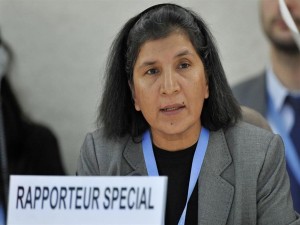 |
The United Nations Special Rapporteur on violence against women, Rashida Manjoo says in some Sri Lankan prisons, cells are infested with rats; beds, mats and pillows are often lacking; and no fans are provided even when temperatures climb to dangerous levels.
Manjoo has said this in a report on the ‘Causes, Conditions and Consequences of Women’s Incarceration’ submitted to the UN General Assembly, the Office of the High Commissioner for Human Rights said today.
In her report, Manjoo notes that in Sri Lanka, in some prisons two bathrooms, which are frequently in a serious state of disrepair, are allocated for every 75 inmates to share.
The UN Special Rapporteur also notes that a cell that should hold 75 prisoners often has to ccommodate around 150.
Manjoo warned that many countries are witnessing a disproportionate rate of increase of incarcerated women, compared to their male counterparts, as well as harsher detention conditions for them than men.
“Disturbingly, in some countries women are also imprisoned for ‘moral’ crimes such as adultery or extramarital sex, facing stringent evidentiary rules that even result in the incarceration of rape victims,” she noted. “Current domestic and international anti-drug policies are one of the leading causes of rising rates of incarceration of women around the world.”
Manjoo also reflected on how gender stereotyping can have disproportionate negative effects on women, including increased sentencing patterns and specific forms of violence, as compared to male prisoners. “Women belonging to ethnic and racial minorities also face a disproportionate rate of incarceration,” she notes in her report.
“A strong link exists between violence against women and their detention, whether prior to, during or post-incarceration,” the human rights expert said. “For instance, evidence suggests that incarcerated women have been victims of violence at a much higher rate prior to entering prison than is acknowledged by the legal system generally.”
Her report also examines the consequences of incarceration on several aspects of women prisoners’ lives. It shows how women prisoners often face harsher conditions than those experienced by their male counterparts. (Colombo Gazette)
Too many women in detention, facing violence and harsh conditions, warns UN expert
NEW YORK / GENEVA (28 October 2013) – Many countries are witnessing a disproportionate rate of increase of incarcerated women, compared to their male counterparts, as well as harsher detention conditions for them than men, the United Nations Special Rapporteur on violence against women, Rashida Manjoo, warned.
“Women are being incarcerated for many reasons including incarceration for illegal activities which they commit in response to coercion by abusive partners,” Ms. Manjoo said during the presentation of her special report* on the ‘Causes, Conditions and Consequences of Women’s Incarceration’ to the UN General Assembly.
“Disturbingly, in some countries women are also imprisoned for ‘moral’ crimes such as adultery or extramarital sex, facing stringent evidentiary rules that even result in the incarceration of rape victims,” she noted. “Current domestic and international anti-drug policies are one of the leading causes of rising rates of incarceration of women around the world.”
Ms. Manjoo also reflected on how gender stereotyping can have disproportionate negative effects on women, including increased sentencing patterns and specific forms of violence, as compared to male prisoners. “Women belonging to ethnic and racial minorities also face a disproportionate rate of incarceration,” she notes in her report.
“A strong link exists between violence against women and their detention, whether prior to, during or post-incarceration,” the human rights expert said. “For instance, evidence suggests that incarcerated women have been victims of violence at a much higher rate prior to entering prison than is acknowledged by the legal system generally.”
Her report also examines the consequences of incarceration on several aspects of women prisoners’ lives. It shows how women prisoners often face harsher conditions than those experienced by their male counterparts.
“Women are vulnerable to numerous manifestations of violence, including rape by inmates and guards, being forced into prostitution, or touched in a sexual manner during searches,” she underscored.
The Special Rapporteur also addressed the issue of young children living in prisons with their mothers, as well as the situation of women that are primary caretakers of children, and the devastating effects of their detention on children left behind.
“In a context of scarce resources and, given that most women offenders rarely pose a threat to the public, it is imperative that States consider alternatives to women’s incarceration,” Ms. Manjoo said, while urging States to address the structural causes that contribute to women’s incarceration, through social, economic, health, educational and justice policies.
“States also have an obligation to act with due diligence to prevent, respond to, protect against, and provide redress for all forms of gender-based violence,” reiterated the Special Rapporteur.
Ms. Rashida Manjoo (South Africa) was appointed Special Rapporteur on Violence against women, its causes and consequences in June 2009 by the UN Human Rights Council. As Special Rapporteur, she is independent from any government or organization and serves in her individual capacity. Ms. Manjoo also holds a part-time position as a Professor in the Department of Public Law of the University of Cape Town.
(*) Check the full report: http://www.ohchr.org/Documents/Issues/Women/A-68-340.pdf
For more information and media requests please contact Gabriela Guzmán (+41 22 917 9412 / [email protected]) or write to [email protected]